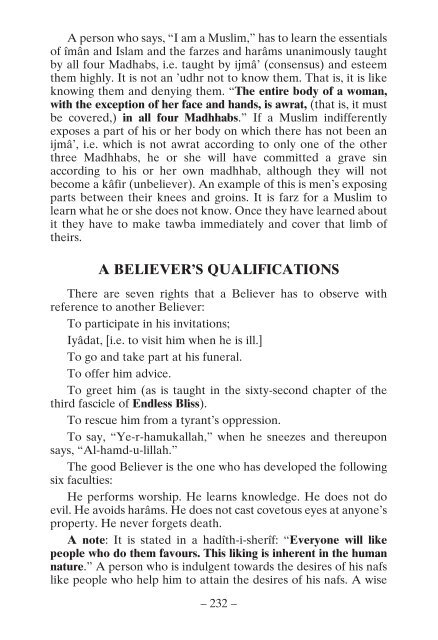Miftah-ul-Janna (Booklet for way to Paradise)
Create successful ePaper yourself
Turn your PDF publications into a flip-book with our unique Google optimized e-Paper software.
A person who says, “I am a Muslim,” has <strong>to</strong> learn the essentials<br />
of îmân and Islam and the farzes and harâms unanimously taught<br />
by all four Madhabs, i.e. taught by ijmâ’ (consensus) and esteem<br />
them highly. It is not an ’udhr not <strong>to</strong> know them. That is, it is like<br />
knowing them and denying them. “The entire body of a woman,<br />
with the exception of her face and hands, is awrat, (that is, it must<br />
be covered,) in all four Madhhabs.” If a Muslim indifferently<br />
exposes a part of his or her body on which there has not been an<br />
ijmâ’, i.e. which is not awrat according <strong>to</strong> only one of the other<br />
three Madhhabs, he or she will have committed a grave sin<br />
according <strong>to</strong> his or her own madhhab, although they will not<br />
become a kâfir (unbeliever). An example of this is men’s exposing<br />
parts between their knees and groins. It is farz <strong>for</strong> a Muslim <strong>to</strong><br />
learn what he or she does not know. Once they have learned about<br />
it they have <strong>to</strong> make tawba immediately and cover that limb of<br />
theirs.<br />
A BELIEVER’S QUALIFICATIONS<br />
There are seven rights that a Believer has <strong>to</strong> observe with<br />
reference <strong>to</strong> another Believer:<br />
To participate in his invitations;<br />
Iyâdat, [i.e. <strong>to</strong> visit him when he is ill.]<br />
To go and take part at his funeral.<br />
To offer him advice.<br />
To greet him (as is taught in the sixty-second chapter of the<br />
third fascicle of Endless Bliss).<br />
To rescue him from a tyrant’s oppression.<br />
To say, “Ye-r-hamukallah,” when he sneezes and thereupon<br />
says, “Al-hamd-u-lillah.”<br />
The good Believer is the one who has developed the following<br />
six fac<strong>ul</strong>ties:<br />
He per<strong>for</strong>ms worship. He learns knowledge. He does not do<br />
evil. He avoids harâms. He does not cast cove<strong>to</strong>us eyes at anyone’s<br />
property. He never <strong>for</strong>gets death.<br />
A note: It is stated in a hadîth-i-sherîf: “Everyone will like<br />
people who do them favours. This liking is inherent in the human<br />
nature.” A person who is ind<strong>ul</strong>gent <strong>to</strong>wards the desires of his nafs<br />
like people who help him <strong>to</strong> attain the desires of his nafs. A wise<br />
– 232 –

















